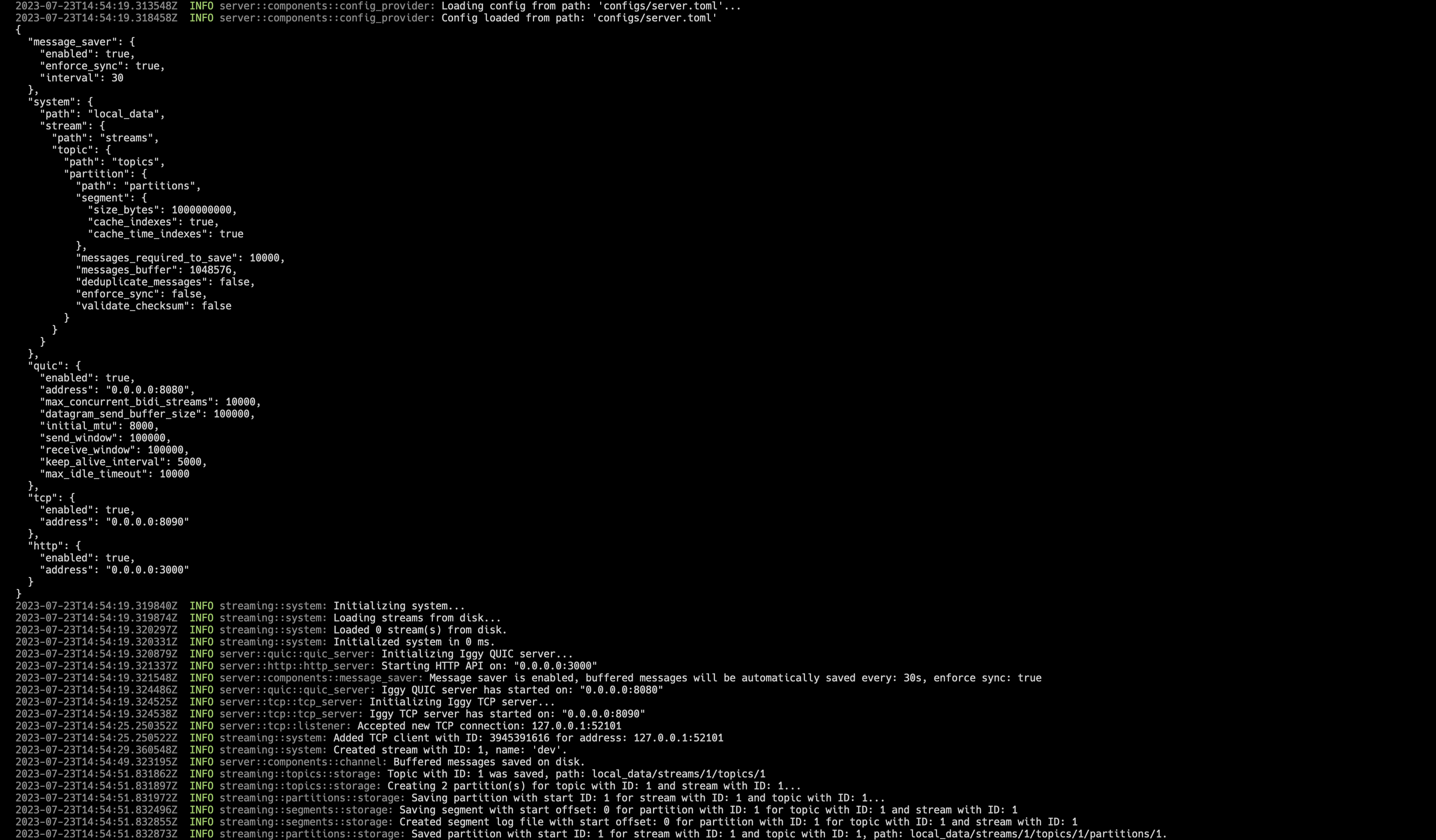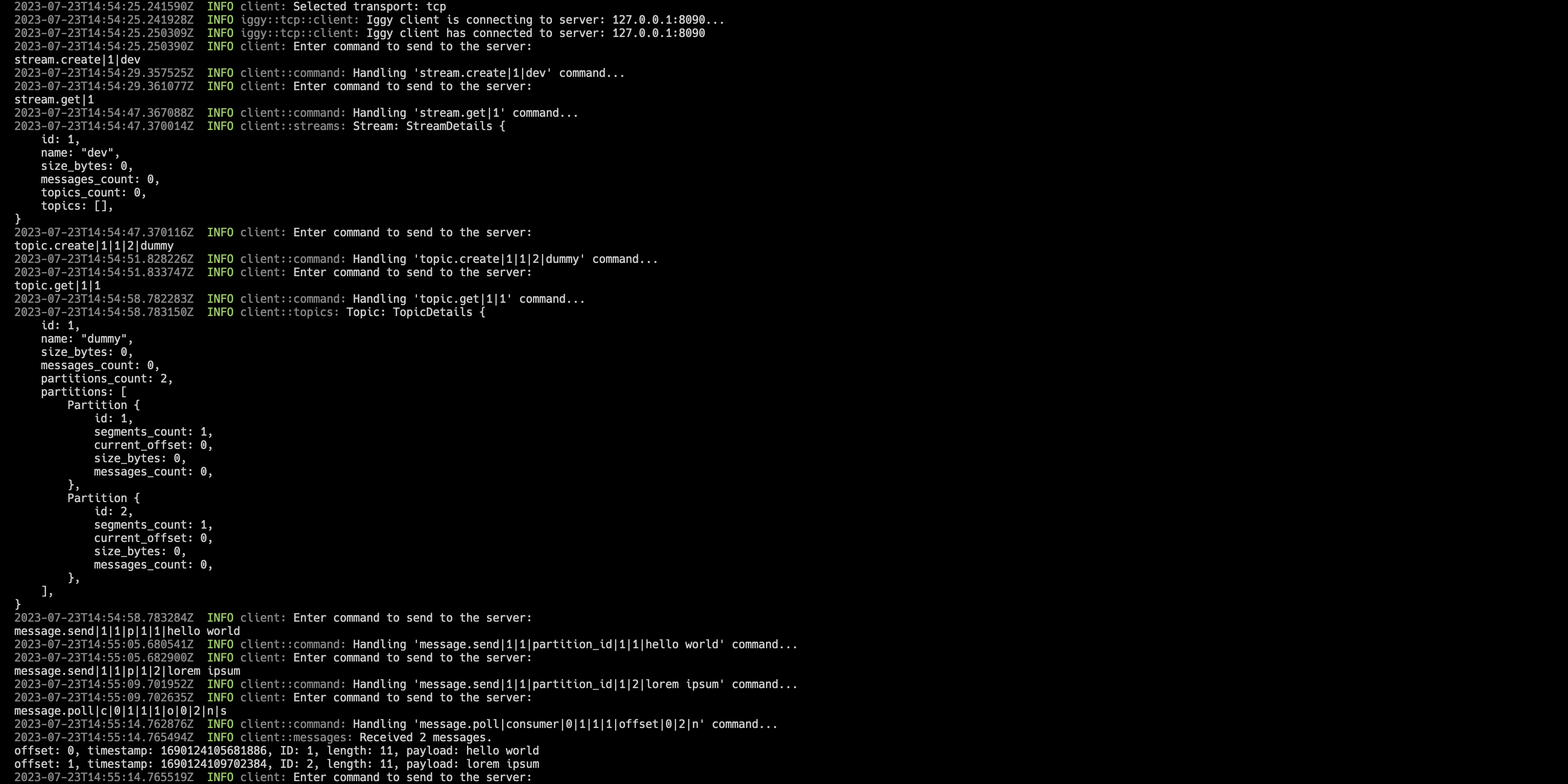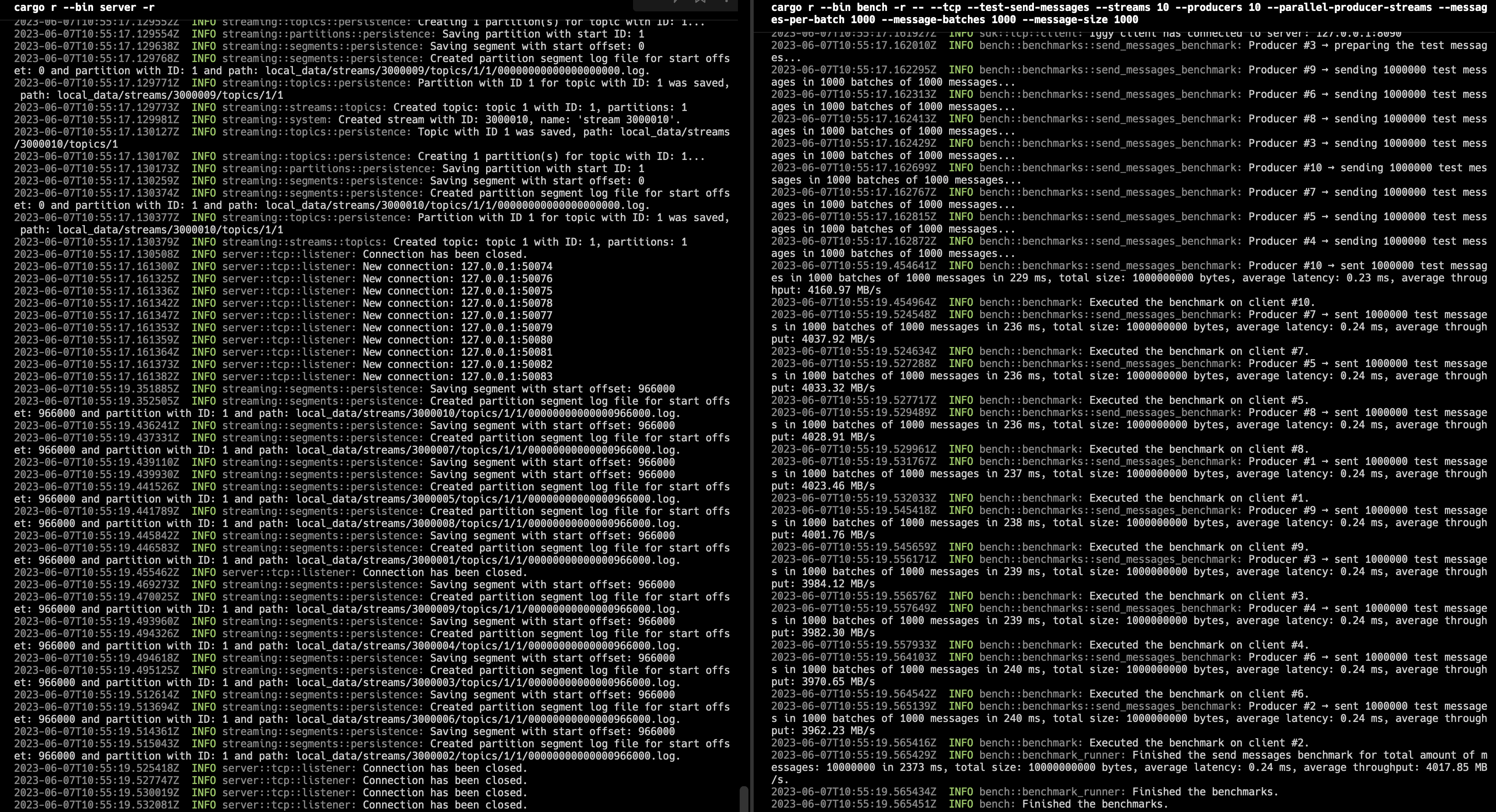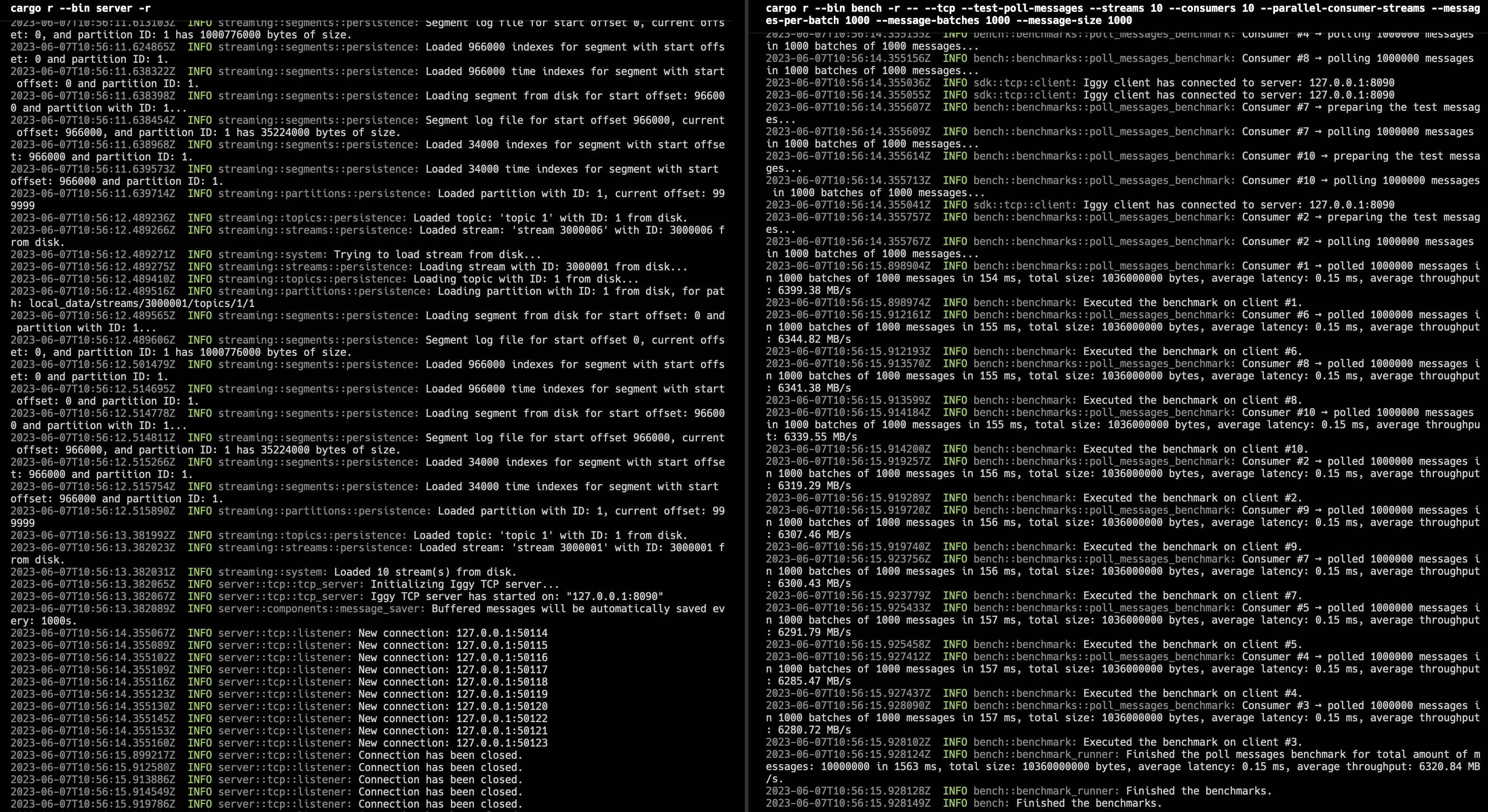Website | Getting started | Documentation | Crates
Iggy is the persistent message streaming platform written in Rust, supporting QUIC, TCP (custom binary specification) and HTTP (regular REST API) transport protocols. Currently, running as a single server, it allows creating streams, topics, partitions and segments, and send/receive messages to/from them. The messages are stored on disk as an append-only log, and are persisted between restarts.
The goal of the project is to make a distributed streaming platform (running as a cluster), which will be able to scale horizontally and handle millions of messages per second (actually, it's already very fast, see the benchmarks below).
It is a pet project of mine to learn more about distributed systems and Rust. The name is an abbreviation for the Italian Greyhound - small yet extremely fast dogs, the best in their class. Just like mine lovely Fabio & Cookie ❤️
- Highly performant, persistent append-only log for the message streaming
- Very high throughput for both writes and reads
- Low latency and predictable resource usage thanks to the Rust compiled language (no GC)
- Support for multiple streams, topics and partitions
- Support for multiple transport protocols (QUIC, TCP, HTTP)
- Fully operational RESTful API which can be optionally enabled
- Available client SDK in Rust (more languages to come)
- Works directly with the binary data (lack of enforced schema and serialization/deserialization)
- Configurable server features (e.g. caching, segment size, data flush interval, transport protocols etc.)
- Possibility of storing the consumer offsets on the server
- Multiple ways of polling the messages:
- By offset (using the indexes)
- By timestamp (using the time indexes)
- First/Last N messages
- Next N messages for the specific consumer
- Possibility of auto committing the offset (e.g. to achieve at-most-once delivery)
- Consumer groups providing the message ordering and horizontal scaling across the connected clients
- Additional features such as server side message deduplication
- Built-in benchmarking app to test the performance
- Single binary deployment (no external dependencies)
- Running as a single node (no cluster support yet)
There's an ongoing effort to build the administrative web UI for the server, which will allow to manage the streams, topics, partitions, messages and so on. Check the Web UI repository
You can find the Dockerfile and docker-compose in the root of the repository. To build and start the server, run: docker compose up.
Additionally, you can run the client which is available in the running container, by executing: docker exec -it iggy-server /client.
The default configuration can be found in server.toml (the default one) or server.json file in configs directory.
The configuration file is loaded from the current working directory, but you can specify the path to the configuration file by setting IGGY_CONFIG_PATH environment variable, for example export IGGY_CONFIG_PATH=configs/server.json (or other command depending on OS).
For the detailed documentation of the configuration file, please refer to the configuration section.
Build the project (the longer compilation time is due to LTO enabled in release profile):
cargo build -r
Run the tests:
cargo test
Start the server:
cargo r --bin server -r
Start the client (transports: quic, tcp, http):
cargo r --bin client -r --transport tcp
Create a stream named dev with ID 1:
stream.create|1|dev
List available streams:
stream.list
Get stream details (ID 1):
stream.get|1
Create a topic named dummy with ID 1 and 2 partitions (IDs 1 and 2) for stream dev (ID 1):
topic.create|1|1|2|dummy
List available topics for stream dev (ID 1):
topic.list|1
Get topic details (ID 1) for stream dev (ID 1):
topic.get|1|1
Send a message 'hello world' (ID 1) to the stream dev (ID 1) to topic dummy (ID 1) and partition 1:
message.send|1|1|p|1|1|hello world
Send another message 'lorem ipsum' (ID 2) to the same stream, topic and partition:
message.send|1|1|p|1|2|lorem ipsum
Poll messages by a regular consumer c (g for consumer group) with ID 0 from the stream dev (ID 1) for topic dummy (ID 1) and partition with ID 1, starting with offset (o) 0, messages count 2, without auto commit (n) (storing consumer offset on server) and using string format s to render messages payload:
message.poll|c|0|1|1|1|o|0|2|n|s
Finally, restart the server to see it is able to load the persisted data.
The HTTP API endpoints can be found in server.http file, which can be used with REST Client extension for VS Code.
To see the detailed logs from the client/server, run it with RUST_LOG=trace environment variable.
See the images below
Files structure
Server start
Client start
Server restart
You can find the sample consumer & producer applications under samples directory. The purpose of these apps is to showcase the usage of the client SDK. To find out more about building the applications, please refer to the getting started guide.
To run the sample, first start the server with cargo r --bin server and then run the producer and consumer apps with cargo r --bin advanced-producer-sample and cargo r --bin advanced-consumer-sample respectively.
You might start multiple producers and consumers at the same time to see how the messages are being handled across multiple clients. Check the Args struct to see the available options, such as the transport protocol, stream, topic, partition, consumer ID, message size etc.
By default, the consumer will poll the messages using the next available offset with auto commit enabled, to store its offset on the server. With this approach, you can easily achieve at-most-once delivery.
To benchmark the project, first start the server and then run the benchmarking app:
cargo r --bin bench -r -- --tcp --test-send-messages --streams 10 --producers 10 --parallel-producer-streams --messages-per-batch 1000 --message-batches 1000 --message-size 1000
cargo r --bin bench -r -- --tcp --test-poll-messages --streams 10 --consumers 10 --parallel-consumer-streams --messages-per-batch 1000 --message-batches 1000
Depending on the hardware, settings in configs/server.toml (the default configuration) or server.json file, transport protocol (quic, tcp or http) and payload size (messages-per-batch * message-size) you might expect over 4000 MB/s (e.g. 4M of 1 KB msg/sec) throughput for writes and 6000 MB/s for reads. The current results have been achieved on Apple M1 Max with 64 GB RAM.
Write benchmark
Read benchmark
- Setup workspace for different projects
- Create granular components with their own behavior and logic
- Define custom conventions such as error types, statuses etc.
- Make use of logging and observability crates
- Create the benchmarking app to test client/server performance
- Implement unit tests
- Implement integration tests
- Implement end-to-end tests
- Implement sample producer & consumer applications to showcase the real usage
- Make use of
async trait(instead of the crate) once available in stable Rust
- Create a basic UDP server
- Make use of QUIC protocol
- Extend QUIC configuration with custom certificates
- Create a basic HTTP server
- Make use of HTTP protocol
- Create a basic TCP server
- Make use of TCP protocol
- Add support for TLS
- Implement user authentication & roles management
- Use async runtime from tokio
- Define the custom binary protocol for communication
- Allow multiple clients to connect to the server
- Provide configuration via terminal arguments
- Provide configuration via custom configuration file
- Implement the graceful shutdown
- Create a basic UDP client
- Make use of QUIC protocol
- Extend QUIC configuration with custom certificates
- Create a basic HTTP client
- Make use of HTTP protocol
- Create a basic TCP client
- Make use of TCP protocol
- Add support for TLS
- Provide configuration via terminal arguments
- Provide configuration via custom configuration file
- Communicate with the server using established binary protocol
- Allow to send commands to the server via simple CLI
- Parse input from the CLI & handle the received response
- Keep the history of the commands in the CLI
- Create a simple terminal UI for the client
- Implement the QUIC SDK for the client
- Implement the HTTP SDK for the client
- Implement the TCP SDK for the client
- Make use of the SDK in client project
- Implement another SDK in C# for dotnet clients
- Implement basic structures such as
stream,topic,partition,segmentetc. - Encapsulate the logic of reading and writing to the stream
- Persist the stream structure to the disk & load it on startup
- Implement
Streamsconsisting of multipleTopics - Implement
Topicconsisting of multiplePartitions - Implement
Partitionconsisting of multipleSegments - Store
Stream → Topic → Partition → Segmentstructures on the disk in the separate directories - Store messages on disk as append-only log using binary format
- Store messages indexes and time indexes on disk for fast access
- Automatically create new partition segments when the current one is full
- Allow clients to create/read/delete topics
- Allow clients to send messages to the specific stream, topic and partition
- Allow clients to poll messages by offsets from the specific partition
- Allow clients to poll messages by timestamps from the specific partition
- Make use of ring buffer to cache in-memory the latest messages to allow fast access to them
- Index messages by their offset to allow fast access to the specific messages
- Index messages by their timestamp to allow fast access to the specific messages
- Allow parallel reading/writing from/to the distinct partitions
- Allow storing client offset for the specific partition
- Implement efficient message writing on disk
- Implement efficient message reading from disk
- Implement zero-copy message reading from disk → sending to network buffer
- Implement message deduplication
- Implement consumer groups for message ordering & horizontal scaling
- Delete old messages bases on retention policy
- Implement consensus protocol for the cluster
- Implement leader election for the cluster
- Implement cluster membership protocol
- Implement cluster discovery protocol
- Implement cluster configuration protocol
- Implement cluster state replication protocol
- Implement cluster state synchronization protocol
- Implement partition replication protocol on different servers
- Allow clients to connect to the cluster
- Implement REST API for the server using Axum
- Expose all the routes to achieve the same functionality as with the QUIC and TCP
- Generate OpenAPI specification for the REST API
- Build a simple UI for the server using chosen framework**







